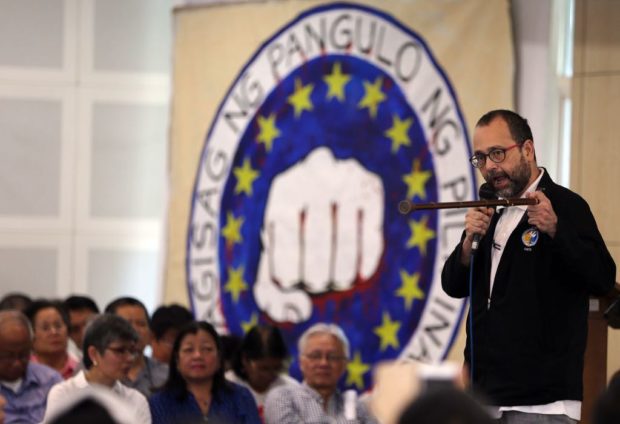Movement against drug killings, ‘acts of tyranny’ launched

Commission on Human Rights chairman Chito Gascon at the launching of Movement Against Tyranny that is calling for the end to the drug killings and the “tyranny and fascism” of the Duterte administration. (Photo by EDWIN BACASMAS / Philippine Daily Inquirer)
Published: 4:14 p.m., Aug. 28, 2017 | Updated: 11:59 p.m., Aug. 28, 2017
A network of multisectoral groups on Monday launched a movement that called for an end to drug killings and the “tyranny and fascism” of the administration, but it stopped short of demanding the resignation of President Rodrigo Duterte.
In a statement, the Movement Against Tyranny (MAT) assailed Mr. Duterte’s war on illegal drugs that had claimed the lives of “mostly poor, small-time drug users and pushers.”
“He continues to incite state security forces to commit willful violence against the people while assuring them of protection from investigation, prosecution and punishment,” the group said.
“In the face of such blatant displays of fascist tyranny, it is time to take a stand, to speak out, and to act,” it added.
Article continues after this advertisementThe MAT also condemned the President’s “rush to end armed conflicts” with the Bangsamoro and communist insurgents.
Article continues after this advertisementIt criticized him for dismissing human rights, undermining democratic institutions, lashing out at the media for critical reports on his administration’s policies, and for declaring martial law in Mindanao.
Rally on Sept. 21
Coalition leaders called on the public to join them at Rizal Park in Manila on Sept. 21, the 45th anniversary of the declaration of martial law by the late strongman Ferdinand Marcos, “to show our solidarity with the victims of human rights violations and to send the message that never again shall we allow tyranny to reign.”
Despite the strong words against Mr. Duterte, the coalition did not call for his resignation.
“At this point, we are not saying anything like that yet,” Sr. Mary John Mananzan told reporters. “We will see how our movement progresses.”
The MAT conveners include Sister Mananzan, former Sen. Rene Saguisag, Rev. Rhee Timbang, Rev. Broderick Pabillo, former Representatives Lorenzo “Erin” Tañada III and Neri Colmenares, ACT Rep. Antonio Tinio, University of the Philippines Chancellor Michael Tan, Free Legal Assistance Group national chair and law dean Jose Manuel Diokno, Bagong Alyansang Makabayan’s Carol Araullo, National Union of People’s Lawyers secretary general Edre Olalia; UP professors Rolando Simbulan and Julkipli Wadi, journalists Vergel Santos and Inday Espina-Varona, actors Mae Paner and Audie Gemora, Karapatan secretary general Cristina Palabay and Edith Burgos, mother of missing activist Jonas Burgos.
The MAT’s launch came days after the funeral of 17-year-old Kian delos Santos, who was gunned down by Caloocan City policemen in an antidrug operation on Aug. 16.
Some 2,000 people joined the funeral of Delos Santos on Saturday, expressing their disgust and alarm over the brazen drug killings carried out by the Philippine National Police on orders of Mr. Duterte.
Police patrol car
Commission on Human Rights (CHR) Chair Chito Gascon, who was invited to the event, noted the presence of a patrol car of the Quezon City Police District outside CICM Maryhill School of Theology in New Manila where the launch was being held.
Gascon likened the police presence to the incident at Ateneo de Manila University on Katipunan Avenue in Quezon City a few days ago where a patrol car pulled up and asked students what they were protesting against.
He said the people would not be cowed by the police presence, and he described it as a form of intimidation.
“We will have each other’s backs,” Paner said.
“Fear can be contagious but courage can be contagious as well,” Paner, also known as Juana Change, said in a brief speech before nearly 200 people who attended the launching.
A victim of the PNP “Oplan Tokhang” narrated her experience of having to hide after her father and brother were killed in a police raid. Her husband survived after being shot, she said.
The woman, whose identity was concealed at the forum, said she was among those who were kept by police in a secret jail in a Tondo police station that was discovered by the CHR in April.
MAT leaders called on the military to end its “indiscriminate aerial bombings, artillery fire, and other destructive military operations that target civilian communities, especially residences, schools, farms and commercial/business establishments.”